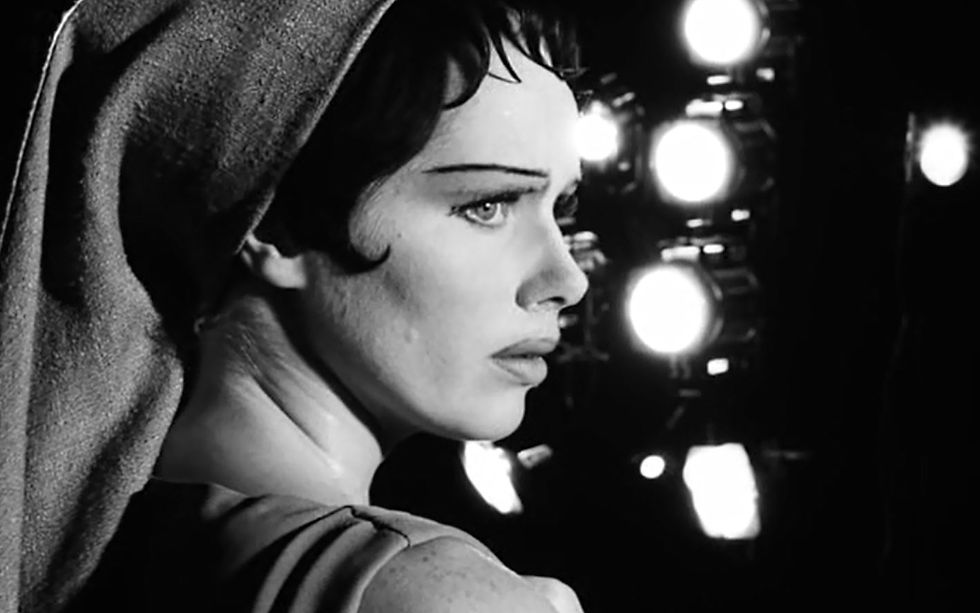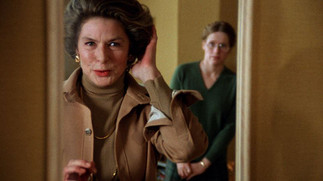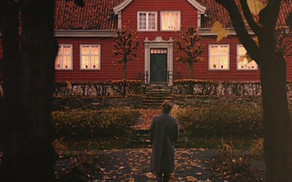It’s time. How long I have revelled in pondersome procrastination as I tried to conjure up a new article. Yet here it was, standing right in front of me all along. Because I’m a total fool for Ingmar Bergman. Despite the opinion I held that he would be very dry, I didn’t expect his filmography to be so explicitly juicy, venomous and downright outrageous. But there you go; I said I was a fool. And true fool I am for the Swedish master.

Born in the early twentieth century, Bergman grew up in a strict household to a Minister and nurse, surrounded by wealth but little freedom. It was here he would explore the fantastical and the bounds of his imaginations. So it made sense that as he matured, he took a great interest in theatre. Bergman eventually went onto write and direct stage plays before transitioning into film. An actor’s director, his wit and intelligence exude into his scripts with fast, dialogue heavy films that paint a dismal picture of the human condition whilst intertwining exciting imagery that explores the reaches of the human capability, of lust and longing, of fear and fancy.

Bergman made over sixty feature films, many TV movies, wrote many books both fictional and on filmmaking, along with writing and directing countless plays whilst conducting multiple affairs with a variety of actresses. He was a very busy man. He's been showered with awards, sweeping the shelves of international trophies every which way he turned, even nabbing three Academy Awards for Best Foreign Language Film and one for Best Original Screenplay. Major directors still cite him as a huge influence on their careers including Pedro Almodóvar, Francis Ford Coppola, Ang Lee, Park Chan-wook and David Lynch to name but a few. The guy created some of the most iconic scenes in cinema: the two women, profile and face on, the boy against the screen from Persona, Death and the knight playing chess on the beach from The Seventh Seal, that tree scene in The Virgin Spring. He’s also been mimicked by many; Abba’s Knowing Me, Knowing You, anyone?
Stemming from his theatrical routes, Bergman formed a troupe of sorts that eventually filled his nightmarish universes, including the marvellous talents of Harriet Andersson, Bibi Andersson, Liv Ullmann, Gunnar Björnstrand, Erland Josephson, Ingrid Thulin, and Max von Sydow. These actors gave some of their best work under his direction and proved, despite being a difficult man that he was magnetic and thrilling to work with. Better still, his long-time collaboration with cinematographer Sven Nykvist, made many of his greatest films transcend the medium, delivering lush, organic and immersive images. But perhaps his most significant collaboration was with the island of Fårö, of which he eventually made his home. It was here he filmed many of his works, the desolate Scandinavian beauty of the land became as much a character of his works as his casts.

Beyond all of this, he was a master storyteller. He flipped cinema on its head. His landscape was the realm of dreams and psychosis. It was believed he was a lucid dreamer and many of what he was tormented by found its way into his films. Perhaps this is what makes them both great and unsettling. His melancholic madness weaved its wonderful magic, created illusion and mysticism, raw sensibility and honesty. He even broke the biggest rule in film, ‘Show, don’t tell’ by telling and not showing… and then sometimes showing us too, and the sometimes absolutely explaining nothing at all about what he just showed. He is worthy of all the praise and longevity of his work. In the end, a lot of people have been moved by his depiction psychological torment, artistic and emotional insanity and (let’s face it) daddy issues.

Before we start, some honourable Mentions:
The Rite (1969): Although made for TV, this short film is quite shocking as it explores a theatre troupe accused of public lewdness due to a pornographic performance.
Summer Interlude (1951): A slightly older entry, I found myself rather engrossed in this beautiful film about a ballerina recalling her first love summers before.
The Silence (1963): There was no reason I excluded this film, other than that I prefer the other two in the Faith Trilogy and that all of them being so masterful, there would not be room for a comedy here and there. A Neglected child is forced to endure the toxicity of two sisters whose resentment of one another bleeds into their every activity.

15. Smiles of a Summer Night (1955)
One of the lighter films amongst psychologically challenging oeuvre, this early film was one of a string of films to brought Bergman much international attention. Probably the only lark on this list, it is still evidence of the directors witticisms and sharp sense of humour. It’s a pretty easy way to start his filmography but I wouldn’t wholly recommend it, he left behind this kind of story and many of the more light-hearted farces choosing to explore the muggy planes of the human subconscious.

In turn of the century Sweden a series of romantic comeuppances unfold as the servants and the upper class find themselves at odds amongst lust and jealousy. A large cast of characters, we see son fall for his new, young stepmother, father eye up the servants and more. It’s fast-paced and full of vitality, something that makes a welcome change in the director’s works.

14. Summer with Monika (1953)
The one that kicked up a storm upon release, marketed as soft-core porn to English-speaking markets, poor Summer with Monika had a seedy reputation for a while in the UK as a raunchy teen melodrama with actual nudity. It was censored and snipped where it could be, robbing the film of its very essence. The film actually explores something far more melancholic, the bloom of young love and the trivialities of fickle youth, it becomes at once romantic and then incredibly honest.

A troubled young man finds himself swept off his feet by the vivacious Monika. The two elope and begin a life together, but are soon faced with harsh realities as idleness and complacency lead them into trouble. Harriet Andersson shines in this early role, one of the many muses of Bergman. She is both likable and utterly infuriating, but ultimately sympathetic. Even after all these years she can hypnotise audiences with this wonderful turn.

13. The Seventh Seal (1957)
I wanted to be controversial when I place this film here. When I think of gateway films into a director, the film must be accessible and a staple of that filmmakers work. When I think of The Seventh Seal, it’s visually iconic sequences, its overwhelming praise within the study of film and its notoriety within the director’s filmography it also comes a little lacklustre. The Seventh Seal is dry. The ending scene is beautiful in the performances, incredibly moving, but the build up to it can seem unapproachable to many. If I was to get someone into Bergman, I would never choose this. It was my first; had I not known his legacy I would have given up then and there. With hindsight, I can see it for the beautiful film it is, but only with time and repeat viewings.

A knight returns from war to a land ravaged by plague. Upon a desolate beach with his squire, he is met with Death, who challenges him to a game of chess. Upon their departure he meets further travellers. Together they make their journey through towns, with Deaths presence ever impeding, the Knight longing to be met with his wife who awaits him in their lonely manor. Upon multiple viewings I have grown to admire this film, and enjoy it. We see recurring players such as Gunnar Björnstrand, Bibi Andersson and Gunnel Lindblom but it is Max von Sydow who is absolutely magnetic. A cinematic pairing on equal heights with Kurosawa and Mifune, Scorsese and de Niro, Allen and Keaton, no one captures the director’s vision of troubled masculinity and fragile humanity like von Sydow.

12. Winter Light (1963)
The second in the Faith trilogy, a series of films that explore spirituality and morality in all its messiness, it oozes pessimism. Of course that makes it a favourite of mine. A pastor, questioning his faith in God and the ministry, resists the affections of a parishioner in love with him and the fatal consequences of his own indifference. A stripped back story, it contains a minimal cast made up of Bergman’s best.

Björnstrand is truly remarkable, playing against his usually mischievous or villainous type as he inhabits the being of a depressed man battling with his own fears. Ingrid Thulin is marvellous as the plain, loyal schoolteacher after the pastors affections, her charisma bleeds through the costume as she forces her way past the impenetrable barrier that keeps the man she loves so far from her. A brief film, it explores big themes whilst remaining understated and eerily peaceful.
11. The Magician (1958)
I had to watch this one a couple of times to really appreciate it. Totally worth it. Von Sydow slays as the titular character, who with his wife and band of deceivers arrive at a mansion one night to perform to the nobility. Within enemy territory, they are faced with scepticism, with the people of the house wishing to make fools of the illusionist. However, not all is quite as it seems.

Bergman plays with the audiences perceptions, this we know at the start from curbing our expectations through the dressing of the stunning Thulin as man and only later exposing her to be the gentle caregiver of her troubled husband; he is saying what you see is not what you get. Meanwhile entwining elements of humour and mysticism, every turn is a curveball on the director’s part. Laced with Gothicism and performance, once again we delve into human psyches upon the backdrop of a performer’s life, an outcast to society. Bergman weaves a story that conjurers to mind the revenge tales we are so familiar with today – perhaps more chaste, it still packs a sturdy punch as the story unfolds.

10. Wild Strawberries (1957)
A road movie of sorts, more importantly, it is Bergman’s masterful tale of the melancholy autumn years of life. The ones loved, lost and the lives led are all captured in this wonderful tale of an aging professor travelling with his daughter-in-law (a steely yet divine Thulin) across country to receive an honorary doctorate. Meeting a group of youths along the way, they give them a lift, soon they pass through places from his youth and he recalls a past laced with bittersweet memories.

The most tender of Bergman’s films, it stars legendary Swedish director Victor Sjöström (the man behind 1921’s infamous silent horror The Phantom Carriage), a great inspiration on the formers work. The uniting of two legends does not overshadow the simple story, nor the marvellous play on past and present. But most notable is the iconic dream sequence of which the film opens with, an homage of sorts to the works of Sjöström, the treading of nightmare as his professor is faced with his own mortality and the gradual passing of time is absolutely haunting. Yet still, Bergman presents to us clarity, if lacking much reassurance, which comes with age as we enter the final years of our lives.
9. The Hour of the Wolf (1968)
The closest Bergman ever got to making a horror film is this eerie psychological drama. An homage to German expressionism, Bergman’s tale unfolds as an interview with the heavily pregnant wife (Ullmann) recalling the final days of her husband, a tormented artist (von Sydow), suffering from insomnia and residing in an isolated cottage who gradually descends into madness. Haunted by their strange neighbours, the couple are forced to endure harrowing nights as the artist’s existential misery, paranoia and obsession grow unbearable.

Long did Fårö become both a place of refuge and isolation to the filmmaker and no series of films quite capture his torment and alienation from his own countrymen. Known as the Fårö trilogy, although unofficial, was followed up by Shame (1968) and The Passion of Anna (1969). Yet Hour of the Wolf is a wildly original film, reflecting a painful state of mind of its director. An exploration of dreams, the realm of reality and psychosis plagued both him and his works, so it’s no wonder that all these aspect weave their way into his narratives and none as strikingly as he managed in this trilogy. Repulsive lust, acts of repugnance told in nightmarish fashion, shadowy halls straight out of gothic horror, it’s a stand out among a string of highly original works.
8. Through a Glass Darkly (1961)
Where Winter Light was a question of faith, Through a Glass Darkly is a cynical study of madness and religion, the confusion of lust and giddy love for an incomprehensible entity launching the madness laced adoration into disturbing ecstasy. Partly shot on Fårö upon request of long-time collaborator and wonderful cinematographer Nykvist, it’s a beautiful first entry to a powerful trilogy. When a woman (Harriet Andersson) vacations on an isolated island, after leaving a facility where she was treated for schizophrenia, with her husband (von Sydow), father (Björnstrand) and brother (Lars Passgård), she begins to experience delusions of God, appearing to her in the form of a spider. Her father uses her in his works of fiction, unbeknownst to her, whilst her brother harbours sexual frustration which borders on incestuous. Meanwhile her husband battles with her whilst craving her physically.

It’s all happening in this family drama, a psycho-sexual assault on the subconscious; it unfolds the mess of which the household has fallen into. A self-centred fathers behaviour is borderline torturous upon his suffering children, and Bergman explores the means of exploitation of the arts in both the fathers writings and to some degree, the sons own attempts at directing a play, later offending his father as he has laced some hard truths into the farce. The most unbearable of all however is the ramifications of Andersson’s fragile mental state as she both fears and desires the hellish depiction of God. The confusion of devoutness reaching scales of love, it is also in these delusions she finds a macabre security and vengefulness as she rejects the advances of her husband yet seeks the approval of her ever distant father, her betrayer.
7. Scenes From a Marriage (1974)
As a group experience, I can only praise this film for how vocal it made us as an audience. Bergman’s work during the seventies was up, down and all around but no one can argue how absolutely spectacular Scenes from a Marriage is. It certainly paved the way for every domestic dispute caught on film, including Marriage Story (Baumbach, 2019) and Before Midnight (Linklater, 2013) following its release yet none hit quite so hard. Released and available as mini-series, the film is equally wonderful with one of my favourite Bergman pairings; the astounding Liv Ullmann and Erland Josephson.

The plot is very simple. Their perfect married life gradually crumbles as revelations of infidelity come to light. The film follows them over the years as heart break and cruelty leave their marriage and lives in tatters. Bergman strips it back as much as he can, following various encounters between the two, with many scenes only revolving around them. We see their vulnerabilities and banalities. Ullmann’s fragility is played up in this epic as we beg her through the screen to grow a backbone and yet the film has us second guessing our own perceptions and understandings. We are made to experience the lies and deceits through hearsay. Their relationship is toxic. But that being said, can we ever really move on. Saraband (2003), the made for TV sort of sequel explores their relationship later in life on the periphery of a different character. It’s not really canon but it kind of is. I would urge one only to watch it as an addition to his filmography rather than an enhancement of the overall experience of this 1974 classic.

6. The Virgin Spring (1960)
A tale of revenge like no other, haunting yet packed with stunning visuals and fascinating folklore, it is the shocking film that has stood the test of time. It should be mentioned that it was influenced by one of my absolute favourites Rashomon (Kurosawa, 1950) but many horror fans will recognise this for the explicit remake by Wes Craven, The Last House on the Left (1972). But where he sheds away any truly meaningful allegory or commentary in place of exploitation and shock visuals, Bergman weaves a spell over this story leaving it timeless and forever unnerving.

A couple seek revenge for the rape and murder of their precious virginal daughter in medieval Sweden when the group of men behind it unknowingly seek shelter at their home. The tragedy is captured in perfect harmony with von Sydow’s weary performance. The beautiful cinematography captured by Nykvist is legendary, in particular the captivating shot of the father uprooting the young tree he intends to uses in his ritual of preparation for the revenge, at first bathing in the sauna and then flogging himself (an act that is used to get the blood flowing) but also could be interpreted as a way of punishment for his future sins, as he rejects forgiveness.

5. Fanny & Alexander (1982)
The most fantastical of Bergman’s works, it was also the last of his cinematic output before his semi-retirement. But what a way to go out on. It has semi-autobiographical treats (a moment I’m rather fond of is a lie told by titular Alexander is rather revealing once realised that Bergman himself did the same thing with regard to his actual father), childhood wonder and mystery, magical uncles, evil stepfathers and enchanting toy shops, and you can find all of this in both its theatrical and Mini-series releases. It’s a sort of Christmas film, with beautiful elements of family and theatre all wrapped into one with luscious sets and costumes, worn by an outstanding cast. It’s delightful and heartfelt.

In turn of the century Sweden, two children are torn from their doting extended family following the death of their thespian father and the remarrying of their mother to a cruel-hearted clergyman. Through the eyes of the children, the merging of reality and fantasy, merge as they try to, at first cope and finally escape the malevolent man who has trapped their mother in an abusive marriage. It truly is an epic piece of cinema, and common seasonal practice each year in Sweden. Don’t let the runtime bother you, it’s worth every minute, with the mini-series being far more satisfying.
4. Shame (1968)
I have no more happiness left to share in this list for now we’re entering the weighty zone. And first is the second and greatest film in the unofficial Fårö trilogy, Shame. Starring Max no Sydow and Liv Ullmann (another underappreciated pairing) in an unspecified time and place, a war has broken out and now a couple must survive and endure both their marriage and the conflict unfolding around them.

Bergman managed to make one of the greatest anti-war films of all time without ever specifying a war, and this move is entirely genius for it. The politics don’t matter here. With the characters knowing little about the conflict as much as the audience, it begins to reflect the experiences of those in years past that would have known little about their own conflicts. The villagers far from cities, the poor unable to own radios, all left in the dark for a fight they had no say in partaking. Most upsetting is the vicious attack the director makes on human kind; he reminds us that we are all despicable. What starts out as a rather likable couple, soon become grotesque as cowardice and scheming drags them further and further apart. Ultimately, it is pessimistic but maybe Bergman was right. In times of struggle, we are inherently selfish.

3. Persona (1966)
The vampiric story of duality, of consciousness and presence. The absolute mind-bender worthy of Kafka. The shocking, ground-breaking work from a director that had already raised the bar of what cinema could be. The story that sets both Liv Ullmann and Bibi Andersson with and against one another in a story oozing with sexual repression, feminine fantasy and obviously, the outward persona that eventually binds these women into one; this is a true landmark of cinema.

An actress (Ullmann) is struck mute in the middle of a performance. No longer speaking, she is assigned a nurse (Andersson) who travels with her to a large house by the sea where, in attempt to get the woman to talk, opens up about herself, her fears, her fantasies and her very darkest secrets. In time, these women’s lives become entwined. I shan’t tell you much more as so much of Persona lacks true comprehension lending itself to fascinating analysis. With an opening scene both haunting and shocking, a child (the youthful persona of the director) stands before a projection, of the faces of Ullmann and Andersson uncannily similar (an inspiration behind the story as Bergman was strike by their likeness when held side by side). And then a series of images flashing on screen, explicit and vulgar, of genitalia and violence. It prepares you for the dysfunction existing in these characters minds, the obscenity far from our expectations of the stars. It’s raw and sensual whilst hideously lewd. But Bergman gets a handle on the psyche of his characters by exploring such vehement processes of his muses.

2. Cries and Whispers (1972)
I can’t help it; Bergman is at his best for me when his films are the most grotesque. And I’m coming to the realisation that maybe, Bergman had some mummy issues too… Supposedly of some inspiration to The Exorcist (Friedkin, 1973), it is certainly one of Bergman’s most unsettling films. Following the devastating failure of his first English language feature The Touch (1971), Bergman went back to his roots. Recruiting three of his favourite stars with Harriet Andersson, Liv Ullmann and Ingrid Thulin, accompanied by Kari Sylwan and featuring minor roles with Erland Josephson and Anders Ek (from 1953’s Sawdust and Tinsel and 1969’s The Rite), Bergman wanted to return to the intimacy of his company of players to explore one of his most unsettling films.

Three sisters in turn of the century Sweden reside in a large country manor. As one (Andersson at her agonising best) lays dying of cancer, consumed by unbearable bouts of agony and suffering, she is only comforted by the religious maid (Sylwan) who tends to her much like the child she lost years before. Meanwhile the other sisters are too consumed in their own psychological torment to offer support. One (Ullmann) is guilt-ridden over the attempted suicide of her husband due to her infidelity. The other (Thulin) is steely and disciplined with much self-loathing, who finds in her sister only revulsion. These women are broken, they’re corrupt and watching their secrets unravel is both excruciating and fascinating. Some scenes play out shockingly, some are worthy of a horror but much that revolves around Cries and Whispers is the need for nurture, for touch. At cinematographer Nykvists’ suggestion, the house is filled with reds, lush carpets and drapery to mimic the warmth of the womb. The return to the childish neediness upon death as experienced by the dying sister, craving to be held whilst the others are too repulsed by death; it’s all so grotesquely upsetting and revealing.
The final scene is one that simply breaks my heart, despite having spent the runtime being mesmerised and horrified. The performances are flawless. There’s no question of that. But in the end, what more could one expect from the master… certainly not the glass scene.

1. Autumn Sonata (1978)
Here we are. This one is my favourite. I thought I would put Cries and Whispers here, after all it’s the one I’ve watched more. But the one that tore me apart was Autumn Sonata. One word is all takes to describe this film: devastating. Liv Ullmann is paired with Ingrid Bergman, in her only Bergman film and her last cinematic venture, having been diagnosed with cancer during the filming. It’s the ultimate rivalry; the conflict between aging mother and neglected, resentful daughter who wants nothing more than to please an absent parental figure. This is Bergman’s ultimate tragedy. Far more stripped back than his other films, a late career entry for the filmmaker; somehow he really knew how to write women. Well certainly here.

A daughter (Ullman) lives with her husband, significantly older than herself, and cares for her bed-ridden, disabled sister. One day, after a seven year absence, her mother (Bergman) who is a classical pianist, returns and it is this that re-opens old wounds and the bitterness that has festered for years on a very long, dark night. Oh how I suffered! Bergman’s mother character is selfish and unbearable, a woman that pursued her career and left behind a family, and worse still seemed to abhor them to some degree. The repulsion mixed with anguish and neediness that Ullmann’s daughter encapsulates upon her return reveals a frightened child so desperate to be loved. Even as a grown woman, her costume suggests an immaturity, a fragility that she never outgrew. And upstairs is a sickly daughter who wishes to be seen, to be held by a mother frightened of her, who takes no responsibility
I found tears escaping during one of Ullmann’s greatest scenes, honestly confronting her mother. It’s a beautiful elegy to mother and daughters; it’s both twisted and all too relatable. In the end, there is only reality left. Bergman’s greatest film plays on memory and psychosis, rooted in the real world rather than the dreamscape, shattering the hopeless dreams of his once youthful daughter character. Autumn Sonata, however, feels cathartic. A lot of words, yet so much unfolds… and how powerful those words can be in the penmanship of Ingmar Bergman.

There you have it: My Top 15 Ingmar Bergman films. Did I put it off (yes) or was I simply thinking really hard about it (sort of)? In the end, I hope you’ve enjoyed reading, find a new favourite and revel in the joys of the Swedish master. Let me know the ones you love?


















































Comentarios